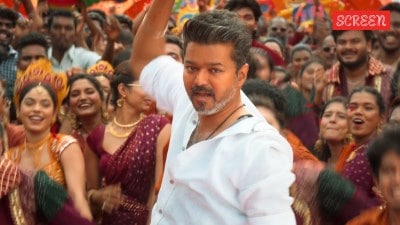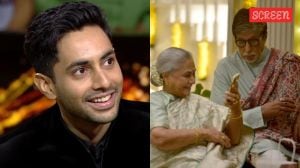Match Winner
Cricket is at the centre of this stunning new novel from Sri Lanka,but as it captures the tumultuous social and political changes it also becomes a remarkable portrait of the country.
Shehan Karunatilaka,author of Chinaman,has an unfair advantage. How could a novel written in the voice of a cricket-fiend sports journalist be dispassionately assessed by one of his own tribe? Being invited to review Chinaman is like being told its okay to cheat. Or at least being allowed an unfair handicap in golf. So what if its central character is Sri Lankan,male and alcoholic? Highlighting such minor differences in order to make both reviewer and review seem somehow objective,is failing to understand the hypnotic power of cricket.
Over and above the free tickets and best seats,all sports/ cricket journalists rejoice in the jobs intangible perks: the in-jokes,the wink-wink nicknames,the hoary tales,the cliche-factory,the never-let-facts-get-in-the-way-of-a-good-story kind of story and the power of their profession to be both magnifying glass and microscope.
Shehan,machan,youve nailed it. Warnings about unfair advantage were already given.
Moving seriously on. Cricket fiction usually falls into two categories. One is the quick read,ideal on long journeys or waiting for the rain to stop and the covers to come off.
Mike Marqusees monumental Anyone But England may have made all us postcolonials whoop with joy,but few will remember that his first book was actually a piece of fiction. Slow Turn was set in India and began with a most compelling line: In Madras,the umpire was murdered and it made us all uneasy. In the West,these bits and pieces one of our favourite cliches of fiction usually centre around murder and intrigue. In the 1970s,TestKill by Ted Dexter and Clifford Makins opened with an Australian bowler keeling over in his run-up,murdered at Lords. Indias recent offerings like The Zoya Factor or The Gamechangers have wandered over to the space between the more sleazy parts of the sports section and Page 3.
The other class of cricket fiction is the weighty,literary cricket novel,the most recent being Romesh Gunesekeras The Match and Joseph ONeills Netherland. In these,the game forms the background to the characters somewhat grey,adult lives. Cricket is what moors them to past happiness or momentary contentment,like in the 9/11 aftermath of Netherland or the expats rootless life in The Match.
Amidst this disparate clutter of neon signs and inner gloom comes the distinct and remarkable Chinaman: The Legend of Pradeep Mathew. Cricket is the centre of the story but so is Sri Lanka,men,women,loyalty,love,friendship and the dark corners of souls and of sport. It is written over headlined segments,some long,some short,that flit dizzyingly between years,seasons and scenarios,but which follow the single,stubborn pursuit of past-his-prime sports writer Wijedasa Gamini W.G. Karunasena. Now into his 60s,W.G. wants to fill in and complete the story of Pradeep Mathew,Sri Lankan bowling genius,who after a brief international career,was reduced to faint irreverence in the history books and a virtually untraceable life. On this trail,we are taken through tumultuous decades of Sri Lankan politics,culture and,of course,when its cricket team went from being easy-beats to
world champions.
Chinamans effortless existence between fact and fiction ensures that both the author and W.G. litter the book full of juicy clues and red herrings. Did a mystery player really take part in a Royal-Thomian? Could there really be a World War II bunker under a cricket ground in Colombo? In a recent interview,Karunatilaka said whenever he is asked about Mathew,his answer always is,Everything about Pradeep Mathew is true,except for his name.
Karunatilaka creates in word,dialogue and context not just the life of W.G. but also the career of Mathew,Tamil cricketer in the muddy 1970s and 80s. The alcoholic W.G.s arrack can be smelt in its pages; arguments and solidarity with his buddy Ariyaratne Byrd sensed as the story moves along; all kinds of people familiar in cricket confronted,all kinds of places visited. At one point,the drunken journo explains to the outside world why his fellow travellers are drawn to what we do for a living with or without alcohol,I have been told by my members of my family that there is no use or value in sports. I only agree with the first part8230; Left-arm spinners cannot unclog your drains,teach your children or cure you of disease. But once in a while the very best of them,will bowl a ball that will bring an entire nation to its feet. And while there may be no practical use in that,there is most certainly value.
Chinaman goes into Lankas notorious betting parlours euphemistically called Turf Accountants,mocks the games powerful commentariat,is laden with dressing room gossip and switches names or assigns them acronyms with such cheeky aplomb that it is possible to recognise virtually ever libel-proof character. Apart from its witty and melancholic narrative,the book also contains sketches and blurry,over-exposed photographs as if a modern Ed McBain wanted to let the reader know that his police procedural was totally authentic.
Cricket may be the most overwhelming presence in Chinaman,but through W.G. and Mathew,the reader is linked to decades of Sri Lankas political unrest and social change. Karunatilakas is a stunning,original portrait of a people and a country. The title of the book comes as much from crickets Chinaman,the left arm-wrist spinner Mathew could bowl all kinds of spin and imitate every bowlers action as it does from a Sinhalese expression,konde bandapu cheena. Directly translated,Karunatilaka explains,it means,pony-tailed Chinaman and when the expression was first coined,it was meant to be a condescending metaphor for the gullible. As the writer says,Like our technologies,our racist stereotypes are decades,sometimes centuries old.
So,what happens at the end? Is Mathew found? Or is he dead? What began with an unfair handicap,should not,at the very least,end with a spoiler. As W.G. says somewhere in the middle of his tale,Is this a story about a pony-tailed Chinaman bowler? Or a tale to tell a pony-tailed Chinaman? That is for you to decide.
The writer is senior editor,Cricinfo
- 01
- 02
- 03
- 04
- 05































